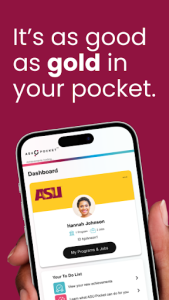
Image from Getty Images, Retrieved from Inside Higher Ed.
For my wild card reflection blogging assignment, I wanted to touch on something that caught my attention in the New Horizons module. As an information professional, it’s a best practice to always keep your eyes on the horizon in regards to upcoming trends and technologies. The 2025 Educause Horizon Report, reports that “technology is providing new ways to document student learning and success” (Educause, 2025). Now what does that mean? Educause reports that there is interest in implementing alternate modes of documentation that record learner’s accomplishments. This can look like a digital wallet in a student’s device that holds badges that students earn from completing courses and learning new skills called digital credentials. Digital credentials can go as far as students having access to their transcripts and diplomas in their personal devices.
An example of this in action is Arizona State University’s ASU Pocket, a “digital credentials wallet that holds a student’s transcript, certificate and other badges” (Inside Higher Ed, 2024). The ASU Pocket enables students to access their credentials themselves which does not require them to request access from a third party like many platforms for transcripts do, reference image below. It’s also been described as a “storytelling opportunity; one thing you can do with this is fill in some of the gaps and spaces that a transcript may not” (Inside Higher Ed, 2024). Grades on a transcript can only go so far, but a digital wallet that holds credentials with badges for soft skills training, extracurricular activities and volunteer work paints a fuller picture of what a student has holistically learned.

ASU Pocket, Image Retrieved from NapKforPC.
With any new technology, there are concerns about cybersecurity. Educause addresses that “the verifiable and tamper-proof nature of these digital records could help to address concerns about credential fraud” (Educause, 2025). Inside Higher Ed reports that higher education institutions are not quick to adopt new technologies so getting these organizations on board may be a challenge. Also, funding is a potential challenge. Institutions would need to assign resources to develop and create digital wallets. That being said, digital wallets are used in the public sector. Some state DMV offices offer digital wallets. Digital wallets are widely used in the private sector with digital concert tickets, airplane tickets, insurance cards and much more.
What excites me about digital credentials is that it’s already here. We’ve all used digital wallets in one capacity or another. Where the growth lies is within the application. How can higher education institutions use digital wallets to make student’s accomplishments more accessible? Would a digital wallet entice students to pursue more skills to earn digital badges? I can see a gamification aspect to using digital credentials. Picture students “friending” each other on a digital wallet platform where they can like, love and leave comments encouraging their fellow students. Items held in a digital wallet can also be shared to social media, so students can share their accomplishments socially, even on professional platforms like LinkedIn.
How does this apply to libraries you might ask? When I read about ASU’s pocket that mentions badges, this reminded me of my local library’s summer reading program. In Sonoma County Library’s summer reading challenge, we are using an app called Beanstack which participants can track their reading (Sonoma County Library, n.d.). While they are tracking their reading they are earning badges, prizes and raffle ticket entries. I’m participating in the adjacent staff summer reading challenge which works the same way but with a different raffle. I personally have loved seeing the digital badges come in on my Beanstack app, I feel like it encourages me to read more and excites me every time I open up the app. SCL only uses Beanstack during the summer months to track this program. What if they were able to develop their own app that functions holds digital credentials? I can picture patrons being able to pull up their digital library card, badges for programs attended and certificates for milestones like 1000 Books Read Before Kindergarten. The possibilities are endless!
This semester I am focusing on the participatory library where libraries are engaging their communities and integrate them into change. If SCL were to implement a digital wallet for their patrons, it would be crucial to get patron feedback on what they think that should look like. Surveys can be released to give patrons the opportunity to advocate for what they would like to see as digital credentials. They can even vote if they want library funding to be allocated to that project. This might be something for me to revisit in the future…
Written by @ali0
References
Educause (2025). 2025 Educause Horizon Report | Teaching and Learning Edition. Educause. Retrieved from https://library.educause.edu/resources/2025/5/2025-educause-horizon-report-teaching-and-learning-edition
Inside Higher Ed (2024). Digital Wallets Explored as Next Generation Transcripts. Inside Higher Ed. Retrieved from https://www.insidehighered.com/news/tech-innovation/alternative-credentials/2024/04/05/digital-wallets-next-generation-college
Sonoma County Library (n.d.). Summer Reading Challenge 2025. Summer Reading Challenge. Retrieved from https://sonomalibrary.org/browse/audience/kids-families/summerreading

@ali0 I really like your thinking here. I want everything to be in my digital wallet from my drivers license to my library card and everything in between.